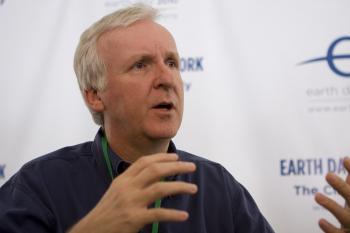James Cameron, Avatar Director, says ‘Reconnect to Nature’
Director James Cameron spoke to The Epoch Times about the key to success in his movies, “Titanic” and “Avatar.”

James Cameron speaks in Washington, D.C. on Earth Day 2010. Jeff Nenarella/The Epoch Times
|Updated:
Matthew Robertson is the former China news editor for The Epoch Times. He was previously a reporter for the newspaper in Washington, D.C. In 2013 he was awarded the Society of Professional Journalists’ Sigma Delta Chi award for coverage of the Chinese regime's forced organ harvesting of prisoners of conscience.
Author’s Selected Articles






